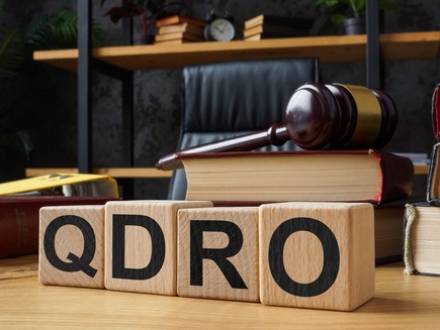Recent Blog Posts
Everything You Need to Know About QDROs in Wisconsin
 When high net worth couples divorce, one of the most complex aspects of property division is determining how to fairly and legally divide retirement accounts. These accounts often represent a substantial portion of the marital estate and must be handled with care to avoid unnecessary taxes, penalties, or delays. In Wisconsin, one of the key tools used to divide certain retirement assets is a Qualified Domestic Relations Order, or QDRO.
When high net worth couples divorce, one of the most complex aspects of property division is determining how to fairly and legally divide retirement accounts. These accounts often represent a substantial portion of the marital estate and must be handled with care to avoid unnecessary taxes, penalties, or delays. In Wisconsin, one of the key tools used to divide certain retirement assets is a Qualified Domestic Relations Order, or QDRO.
Our Wisconsin divorce attorneys for high net worth divorces will walk you through the essentials of QDROs in Wisconsin divorce cases: what they are, how they work, and the critical role they play in securing a fair distribution of retirement benefits.
What Is a QDRO?
A Qualified Domestic Relations Order (QDRO) is a court order that allows a retirement plan to pay a portion of one spouse’s retirement benefits directly to the other spouse following a divorce. These orders are governed by federal law under the Employee Retirement Income Security Act of 1974 (ERISA), and they apply to most employer-sponsored retirement plans. Common examples include 401(k)s, 403(b)s, pensions, and profit-sharing plans. IRAs, on the other hand, do not require a QDRO and are instead divided using a different process under the Internal Revenue Code.
Can You Get Lifelong Medical Care in a Personal Injury Claim?
 When a serious injury results in lifelong medical needs, accident victims often worry about how they will afford ongoing care. Medical bills can pile up quickly, and long-term treatment can place a financial strain on both the injured person and their family. If someone else was responsible for your injuries, you may be able to recover compensation to cover lifelong medical expenses.
When a serious injury results in lifelong medical needs, accident victims often worry about how they will afford ongoing care. Medical bills can pile up quickly, and long-term treatment can place a financial strain on both the injured person and their family. If someone else was responsible for your injuries, you may be able to recover compensation to cover lifelong medical expenses.
At Gimbel, Reilly, Guerin & Brown, LLP, we are a well-resourced personal injury firm that has the ability to connect clients with expert witnesses, including physicians who can testify about the extent of an injury and the need for long-term financial assistance. If you or a loved one has suffered a catastrophic injury, our Wisconsin personal injury lawyers are prepared to fight for the full compensation you need.
When Do Personal Injury Cases Involve Lifelong Medical Care?
Not all personal injury claims involve lifelong medical expenses, but certain types of injuries often require ongoing care. When an injury is severe enough to cause permanent disability or chronic medical conditions, the financial burden can be overwhelming.
What to Do if Another Site Steals or Posts Your Adult Content

If you have found your personal videos or images posted on a website without your permission, you may feel angry, embarrassed, or taken advantage of. You likely want to get your original works of authorship taken down as soon as possible. Unfortunately, this is becoming a more common problem, especially for people who use platforms like OnlyFans, Twitter, Reddit, and Instagram to promote their work.
The ability to get adult photos and videos taken down is especially important for people who used to create this type of content, but who have stopped and now want their videos and images scrubbed from the internet. Not being able to get sensitive personal content taken down from other websites can make it feel difficult to get on with normal life, especially if you are worried that people you know may see this content.
Child Custody, Parental Alienation, and High Net Worth Divorce
 One of the most challenging aspects of divorce when young children are involved is determining custody of those children. Because of the public scrutiny and significant assets at stake in high net worth divorces, this type of divorce is often high-conflict, especially when it comes to child custody matters.
One of the most challenging aspects of divorce when young children are involved is determining custody of those children. Because of the public scrutiny and significant assets at stake in high net worth divorces, this type of divorce is often high-conflict, especially when it comes to child custody matters.
When the divorce is high-conflict, child custody can become a tool to punish or exert control, or to "win" the divorce proceedings. One parent may also use parental alienation as a tool to manipulate children against the other parent. Those facing these legally and emotionally complex considerations in a high net worth divorce can benefit from the advice of a Milwaukee, Wisconsin divorce attorney.
Parental Alienation and High Net Worth Divorce
What Is Parental Alienation?
Parental alienation occurs when one parent intentionally and consistently attempts to manipulate or influence a child against the other parent. Parental alienation is not only difficult and painful for the parent affected by the child’s change in behavior, but can also emotionally damage a child and may be considered a form of child abuse (although it is not illegal).
Four Reasons You Need a Lawyer for a Car Accident Lawsuit
 Getting into a serious car accident can negatively impact many aspects of your life. If you have been injured in a car accident, chances are you have lost time at work and had to spend much of it at doctors’ appointments. Depending on the severity of the accident, your future ability to work or engage in the activities you cherish could be in question. You may be in physical pain and experiencing grief even as you read this.
Getting into a serious car accident can negatively impact many aspects of your life. If you have been injured in a car accident, chances are you have lost time at work and had to spend much of it at doctors’ appointments. Depending on the severity of the accident, your future ability to work or engage in the activities you cherish could be in question. You may be in physical pain and experiencing grief even as you read this.
No matter what, getting injured in a serious car accident is a stressful and potentially devastating event, especially when it was caused by someone else’s negligence and never should have happened in the first place. Thankfully, the law provides an avenue to be compensated for losses suffered in a car accident through a personal injury lawsuit. An experienced Milwaukee, WI personal injury attorney is here to vigorously represent you and fight for maximum compensation on your behalf.
Circumstantial vs. Direct Evidence in Wisconsin Criminal Cases
Being arrested and charged with a crime can be a frightening prospect. A criminal conviction has serious consequences for a person’s life, finances, career, and freedom. However, those who are facing criminal charges may not understand the laws involved in their case, the processes followed during an investigation, or their options for defense.
One aspect of criminal prosecutions that often causes confusion is the different evidence that can be used to show a person’s guilt. During a Wisconsin criminal case, it is important to understand the difference between direct evidence and circumstantial evidence so you can carefully weigh your options and decide whether to take a plea deal or go to trial.
In addition to understanding the types of evidence that may play a role in a criminal trial, those who are accused of committing crimes will also need to understand the ways that this evidence may be challenged. An experienced Milwaukee, WI criminal defense attorney can cast doubt on the validity of certain types of evidence or witness testimony, they can challenge the narrative proposed by prosecutors and, if need be, appeal a conviction on the grounds that evidence was obtained or handled improperly.
Wire Fraud and Identity Theft Investigations Go Hand in Hand
 Some criminal investigations go hand in hand, such that if you find yourself being investigated for one crime, it is likely that you will be investigated simultaneously for the other. This is the case with wire fraud and identity theft. A scheme to commit one is likely to involve the other because the criminal activities needed to commit wire fraud are usually also used to perpetrate identity theft. As both federal wire fraud and identity theft are serious crimes, an experienced Milwaukee, Wisconsin federal crimes defense attorney is here to defend your rights if you are being investigated for these crimes.
Some criminal investigations go hand in hand, such that if you find yourself being investigated for one crime, it is likely that you will be investigated simultaneously for the other. This is the case with wire fraud and identity theft. A scheme to commit one is likely to involve the other because the criminal activities needed to commit wire fraud are usually also used to perpetrate identity theft. As both federal wire fraud and identity theft are serious crimes, an experienced Milwaukee, Wisconsin federal crimes defense attorney is here to defend your rights if you are being investigated for these crimes.
What Is Federal Wire Fraud?
Wire fraud involves defrauding someone using electronic communication including telephone text messages and online methods such as email or social media. It usually involves deceiving someone into sending money or sensitive personal information. For example, sending out phishing text messages seeking social security or bank account details and then using that information to make a wire transfer to yourself would constitute wire fraud.
Think Your Spouse is Lying About Their Income? Protect Yourself in Your Divorce
 One of the biggest issues that will be determined in a divorce is the division of assets between spouses. For this reason, having accurate and truthful information about your spouse’s income and the rest of their assets is vital to ensuring that you receive a fair share according to the terms of the law.
One of the biggest issues that will be determined in a divorce is the division of assets between spouses. For this reason, having accurate and truthful information about your spouse’s income and the rest of their assets is vital to ensuring that you receive a fair share according to the terms of the law.
If your spouse is hiding assets, it can impact what you receive in a divorce and add to the already significant stress of divorce. An experienced Wisconsin divorce law attorney can work on your behalf to ensure that your spouse does not get away with hiding any income or assets in the divorce.
What Does Wisconsin Law Say About Hiding Assets in Divorce?
Wisconsin is a community property state, meaning that any income earned by one spouse during marriage is owned by both spouses. During a divorce, a court will aim to divide the marital assets, income, and debt of the spouses equally. Wisconsin requires that spouses fully disclose their assets, and hiding assets in divorce is against the law.
Charged with Healthcare Fraud in Wisconsin? You Need a Lawyer
 If you are a healthcare provider, a charge of healthcare fraud can have serious implications. Not only do you face potential criminal penalties such as jail time and fines, but the accusation can threaten your livelihood and reputation. If convicted of healthcare fraud, you could be excluded from participating in federal healthcare programs and even lose your license to practice medicine. These are serious charges that require the help of an experienced Milwaukee, WI attorney ready to defend you.
If you are a healthcare provider, a charge of healthcare fraud can have serious implications. Not only do you face potential criminal penalties such as jail time and fines, but the accusation can threaten your livelihood and reputation. If convicted of healthcare fraud, you could be excluded from participating in federal healthcare programs and even lose your license to practice medicine. These are serious charges that require the help of an experienced Milwaukee, WI attorney ready to defend you.
What Is Healthcare Fraud?
Healthcare fraud involves intentionally misrepresenting or providing deceptive information about medical claims. Usually, a healthcare fraud allegation accuses a doctor, clinic, or other healthcare provider of charging for services that were not provided or medically necessary in order to pocket the money.
Other examples of healthcare fraud include:
Can You Be Charged with Conspiracy Without Committing a Crime?
 The crime of conspiracy is unusual given the fact that, even if you do not technically commit another crime, you can be charged with conspiracy to commit a crime if you start planning the crime and meet other elements of the criminal offense. That is because the crime of conspiracy is its own separate crime – for example, you could be charged with conspiracy to engage in price fixing, even if you were not charged with the crime of price fixing itself.
The crime of conspiracy is unusual given the fact that, even if you do not technically commit another crime, you can be charged with conspiracy to commit a crime if you start planning the crime and meet other elements of the criminal offense. That is because the crime of conspiracy is its own separate crime – for example, you could be charged with conspiracy to engage in price fixing, even if you were not charged with the crime of price fixing itself.
Federal law imposes criminal liability on conspiracy to commit certain white-collar crimes that are perpetrated in a business context. If you have been charged with the crime of conspiracy, you could face serious criminal penalties and reputational consequences. For this reason, it is important to consult with an experienced Milwaukee criminal law attorney who understands this complex area of law and knows how to build a strong defense.

 By:
By: 





